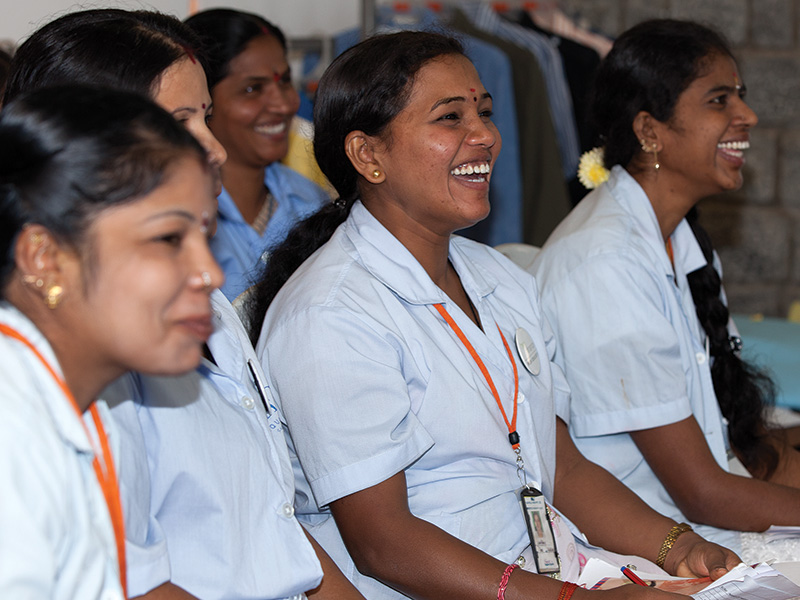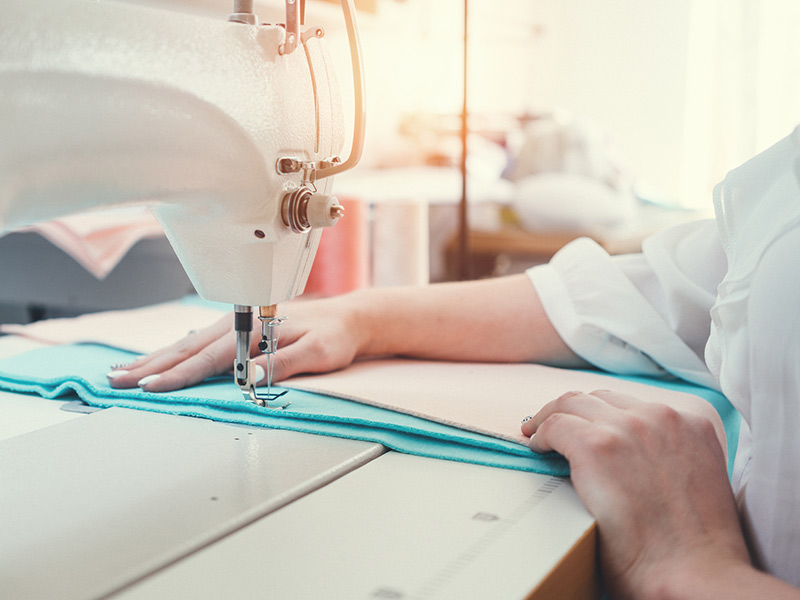
HERfinance: Increasing Financial Inclusion Among Women Workers in Global Supply Chains| Case Studies | BSR
CASE STUDIES
HERfinance: Increasing Financial Inclusion Among Women Workers in Global Supply Chains
SUNDAY NOV 15, 2015
Between 2012 and 2014, BSR piloted the HERfinance program with 10,000 garment factory workers in India. As a result, 38 percent more workers began using a formal bank account for savings, and 91 percent of workers increased their rates of savings.
The Challenge
The garment industry is a critical source of formal employment for millions of the world’s poor, and particularly for women who comprise the majority of this sector’s workforce. For these women, garment factory work provides an opportunity to earn a salaried wage and contribute to their household’s financial well-being.
However, many low-income, wage-earning women lack financial literacy and access to formal financial services. As a result, they often rely on informal mechanisms such as saving cash at home, investing in riskier assets like jewelry or livestock, or relying on informal group-savings mechanisms. Women are also far less likely than men to make decisions about how their wages should be allocated. According to a BSR survey of 500 garment workers in Bangalore and Delhi, India, only 48 percent of female garment workers decide what to do with their monthly wages, compared to 90 percent of their male peers.
Given that women tend to invest 90 percent of their earnings back into the health, nutrition, and education of their families, increasing women’s financial capabilities can lead to long-term prosperity for households, families, and communities. BSR’s HERfinance program is working to increase the financial awareness and access to financial services among this population of women.
Our Strategy
In 2012, BSR expanded our successful HERproject initiative—which primarily focused on helping women in global supply chains access health information and services—to address the need for greater financial literacy and improved access to formal financial products and services among the same population of women. With a grant from The Walt Disney Company, BSR partnered with leading companies such as ANN INC., Levi Strauss & Co., Nordstrom, Primark, and Timberland to pilot the HERfinance program with some of their suppliers in India.
From 2012 to 2014, we piloted HERfinance at 11 garment factories, reaching more than 10,000 low-income workers, the majority of whom were women. Working with local NGOs, BSR helped teach workers about the benefits of using formal financial products and services, and we helped them improve their financial habits generally—teaching women how to use an ATM, encouraging them to set financial goals and discuss financial matters with their families, helping them increase their savings through budgeting and planning, and more.
Our Impact
The results of the HERfinance pilot revealed significant improvements in workers’ financial knowledge, confidence, and behaviors, and also improvements in the workplace environment.
Based on BSR surveys of 500 workers who had completed the HERfinance program, we found that there was a 39 percent decrease in women saying they couldn’t use an ATM, and a 23 percent increase in women saying they, not someone else, made decisions about what to do with their salaries. Of the men and women surveyed, 38 percent were more likely to save their salaries in a formal bank account, and 91 percent said their rates of saving increased through better financial planning and budgeting.
Among both men and women, there was a threefold increase in workers who said they felt they could meet their families’ needs with their existing salaries. This may have contributed to their job satisfaction, as 97 percent of workers said their perception of their employer improved because of the HERfinance program at their factory.
After the pilot, BSR received a significant grant from the Bill & Melinda Gates Foundation to scale our work across South Asia and to introduce workers to the formal financial system by switching their employers’ payroll from a cash-based to an electronic system. We plan to hold a series of global roundtables to encourage more companies to partner with us, with a goal to empower 300,000 low-income workers over the next few years.
Lessons Learned
The HERfinance success indicates that the workplace is an efficient intervention point for programs that improve the lives of low-income workers. Not only can financial-education programs be delivered to large numbers of women workers cost effectively, the workplace can become a location to introduce women workers to critical products and services.
Commitments to worker well-being from large global buyers are critical to scaling programs such as HERfinance, since these companies hold the business relationships with employers of large numbers of low-income women. These global buyers also can encourage their suppliers to better understand workers’ needs, and to make investments that improve both worker livelihoods and the factory business.
#Financial Services, #HERproject, #Inclusive Economy, #Supply Chain, #Womens Empowerment
YOU MIGHT ALSO LIKE
REPORTS
The Business Role in Creating a 21st-Century Social Contract
The time is now for an overhaul of the social contract to address 21st-century realities and needs. A new social contract can deliver long-term value creation that enables economic security and mobility, is genuinely inclusive, and addresses challenges such as the transition to clean energy and the emergence of a digital world.
REPORTS
Lessons Learned from a Market-Based Approach to Inclusive Employment
This report captures lessons learned from BSR’s launch, implementation, and sunset of the Global Impact Sourcing Coalition.
BLOG
What Companies Need to Know about the International Financial Reporting Standards Foundation
The International Financial Reporting Standards (IFRS) Foundation is exploring whether and how to set up an International Sustainability Standards Board (ISSB). We discuss three opportunities and risks that businesses should know about the potential new sustainability standards.
BLOG
Gender Equity in the Just Transition and the Shift to Green Jobs
As the energy transition becomes a reality, it is essential to build a shared understanding of what a sustainable, green workforce looks like and how women and men can benefit equally from this transition.
BLOG
Modernizing the Social Contract in 2021: Five Developments for Business to Consider
COVID-19 has shown—in a tragic way—how interconnected the world is. All the events of the past year and a half have also reinforced and deepened the urgent need to redefine the social contract and the key role business must play in that effort.
BLOG
Joining the UN Generation Equality Forum is Smart Business
The Generation Equality Forum (GEF) offers a once-in-a-generation opportunity to come together to build an ambitious agenda to empower women and girls. BSR member PayPal discusses its role as a Generation Equality Forum Action Coalition Lead and what motivated it to take part in the Forum.
BLOG
Six Things Business Should Know About the EU Taxonomy
Companies based in, doing business with, and with investors in the EU will need to pay attention to the EU Taxonomy and its impact on investments.
BLOG
Keeping Workers in the Loop
How will circular fashion, at scale, impact job opportunities and quality? Keeping Workers in the Loop brings together industry leaders and stakeholder to explore circular fashion and jobs in the decade ahead by taking a futures approach.
ABOUT US
BSR™ is an organization of sustainable business experts that works with its global network of the world’s leading companies to build a just and sustainable world. With offices in Asia, Europe, and North America, BSR™ provides insight, advice, and collaborative initiatives to help you see a changing world more clearly, create long-term business value, and scale impact.
OUR GLOBAL OFFICES
- Copenhagen
- Guangzhou
- Hong Kong
- New York
- Paris
- San Francisco
- Shanghai
- Tokyo
ELSEWHERE
SUBSCRIBE TO OUR LIST
SIGN ME UP
ABOUT US
HOW WE WORK
- OUR FOCUS
- Areas of Expertise
- Industry Focus
- OUR SERVICES
- Sustainability Consulting
- Collaboration
- Membership
- Research
OUR INSIGHTS
EVENTS
CAREERS
BSR WEB PROPERTIES
- Clean Cargo | Sustainability in the Cargo Shipping Industry
- Global Impact Sourcing Coalition | Build a More Inclusive Global Supply Chain
- Healthy Business Coalition | Good Health is Good Business
- HERproject | Empowering Women in the Global Supply Chain
- Maritime Anti–Corruption Network
© 2021 Business for Social Responsibility™ | The Business of a Better World™ | Data Protection and Privacy Policy | Cookie Policy | Terms of Services | Contact










